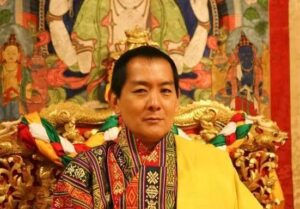The values, beliefs, and ethnic practices of the Bhutanese people have been passed down through generations, fostering a deep sense of hospitality and spirituality. These traditions are rooted in mindfulness and respect for both the spiritual and communal aspects of life.
For instance, before eating, it is customary to offer the first portion of food to Kenchosum (the Triple Gem) at the household shrine. This practice is observed with every meal, accompanied by a prayer of offering (tomche), demonstrating gratitude, and reverence before consuming anything.

In earlier times, when visiting someone’s home, it was customary to carry gifts as a gesture of goodwill. A bottle of ara (locally brewed wine), a bangchung (bamboo plate) filled with rice, and three eggs were common offerings. Visiting empty-handed was considered inauspicious, not only for the guest but also for the host. After feasting at someone’s home, it was customary to leave a token of gratitude in the form of money (soelra), honoring the hospitality received. This was the way of life practiced by our forefathers, a tradition steeped in mutual respect and appreciation.
The Bhutanese spirit of hospitality is further reflected in the timeless lesson passed down by elders: “Don’t let someone visiting your house leave without eating or drinking something!” Even in times of scarcity, when there was little to offer, families would borrow from neighbors to ensure their guests were served. This unwavering commitment to hospitality exemplified the generosity and warmth of the Bhutanese people.
In those days, alm beggars and spiritual practitioners were a common sight. These practitioners, devoted to spiritual pursuits in mountains, forests, caves, and monasteries, relied on alms for sustenance. It was considered a moral obligation to never turn away a beggar empty-handed. Guests and beggars alike were welcomed, offered food and drink, and shown kindness. Even if resources were limited, it was important to give what one could, demonstrating compassion and understanding.
Such acts of generosity were not just customs but were deeply rooted in the Buddhist principle of ‘Ley Judrey’—the law of karma. The belief that one’s actions inevitably return to them served as a guiding principle in everyday life. As my parents often reminded me, “We will fall sick and die one day; what goes around comes around”. This teaching instilled a sense of morality, compassion, and mindfulness from an early age.
Contemplating impermanence and practicing ‘Ley Judrey’ ensured that one’s moral compass remained intact, fostering a way of life that emphasized kindness, generosity, and spiritual awareness. These timeless values continue to define the essence of being Bhutanese, shaping a community that cherishes both human connection and spiritual fulfillment.



